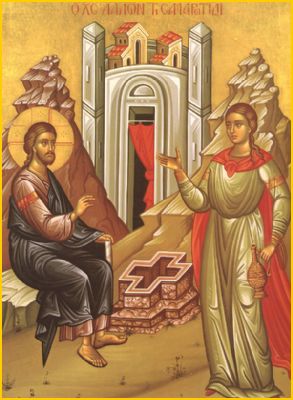Related Research Articles
Alexandra is a female given name of Greek origin. It is the first attested form of its variants, including Alexander. Etymologically, the name is a compound of the Greek verb ἀλέξειν and ἀνήρ. Thus it may be roughly translated as "defender of man" or "protector of man". The name Alexandra was one of the epithets given to the Greek goddess Hera and as such is usually taken to mean "one who comes to save warriors". The earliest attested form of the name is the Mycenaean Greek 𐀀𐀩𐀏𐀭𐀅𐀨, written in the Linear B syllabic script. Alexandra and its masculine equivalent, Alexander, are both common names in Greece as well as countries where Germanic, Romance, and Slavic languages are spoken.
Andrea is a given name which is common worldwide for both males and females, cognate to Andreas, Andrej and Andrew.
Kristina is a feminine given name and a regional variant of Christine. Notable people and characters with the name include:
Bogdan or Bohdan is a Slavic masculine name that appears in all Slavic countries as well as Romania and Moldova. It is derived from the Slavic words Bog/Boh, meaning "god", and dan, meaning "given". The name appears to be an early calque from Greek Theodore or Hebrew Matthew with the same meaning. The name is also used as a surname in Hungary. Bogdana is the feminine version of the name.
Novak, Novák, or Nowak, is a surname and masculine given name, derived from the Slavic word for "new", which depending on the exact language and usage, translates as "novice", "new man", "newcomer", or "stranger".
Ivana is a feminine given name of Slavic origin that is also popular in southern Ireland, France, French-speaking Canada, the Mediterranean and Latin America. It is the feminine form of the name Ivan, which are both the Slavic cognates of the names Joanna and John. It may also be spelled as Ivanna.

Nikola is a given name which, like Nicholas, is a version of the Greek Nikolaos (Νικόλαος) and it means "the winner of the people". It is common as a masculine given name in the South Slavic countries, while in West Slavic countries it is primarily found as a feminine given name. There is a wide variety of male diminutives of the name, examples including: Niko, Nikolica, Nidžo, Nikolče, Nikša, Nikica, Nikulitsa, Nino, Kole, Kolyo, Kolyu.
Tomislav is a Slavic masculine given name, that is widespread amongst the South Slavs.

Svetlana is a common Orthodox Slavic feminine given name, deriving from the East and South Slavic root svet, meaning "light", "shining", "luminescent", "pure", "blessed", or "holy", depending upon context similar if not the same as the word Shweta in Sanskrit.

Ivan is a Slavic male given name, connected with the variant of the Greek name Iōánnēs from Hebrew יוֹחָנָן Yôḥānnān meaning 'God is gracious'. It is associated worldwide with Slavic countries. The earliest person known to bear the name was the Bulgarian Saint Ivan of Rila.
Filip is a masculine given name and a surname, cognate to Philip.
Adriana, also spelled Adrianna, is a Latin name and feminine form of Adrian. It originates from present day Italy and Spain.
Snežana, also transliterated Snezhana, is a Slavic, Circassian, and Lithuanian feminine given name, possibly derived from sneg ("snow") and žena ("woman"). Another interpretation is that Snežana is a name of folk origin, derived from the words "snow" and "jana". It is popular in former Yugoslavia, Russia and Bulgaria. Other spellings include Snježana and Sniježana, found in Ijekavian-speaking areas. Snežana was the fifth most popular name in North Macedonia in 2011. In the decade from 1960 to 1970 Snežana was the most popular name in Serbia. Based on research conducted on 31 December 2007 by the Statistical Office of Slovenia, Snežana and Sergei were the 198th most common personal names in Slovenia.
Milena is a feminine given name of Slavic origin derived from "mil" meaning "gracious", "pleasant" or "dear". It is the feminine form of the male names Milan and Milen. It is popular in Slavic countries such as Serbia, Montenegro, Poland, Bulgaria, the Czech Republic, Ukraine, Croatia, Russia, Belarus, as well as other countries like Armenia.
Dragana is a Slavic given name for females. It is the feminine form of the male name Dragan, which comes from the Slavic element dorogo/drago, which means "precious".
Vera is a female given name of Slavic origin, and by folk etymology it has also been explained as Latin vera meaning "true". In Slavic languages, Vera means faith. The name Vera has been used in the English speaking world since the 19th century and was popular in the early 20th century. In Turkish Vera means piety.
Monika is a female name in German, Scandinavian, Czech, Slovak, Polish, Slovene, Croatian, Estonian, Lithuanian, Latvian and Hungarian (Mónika) which can also be seen in India. It is a variation of Monica, stemming from the word "advisor" in Latin and "unique" in Greek.
Ana is a version of the female given name Anna meaning "favour" or "grace".
Ivo is a masculine given name, in use in various European languages. The name used in western European languages originates as a Normannic name recorded since the High Middle Ages, and the French name Yves is a variant of it. The unrelated South Slavic name is a variant of the name Ivan (John).
Jasmina, sometimes Jasminka, as a feminine variant, and Jasmin, sometimes Jasminko, as a masculine variant, are given names used in Bosnia and Herzegovina, Croatia, Macedonia, Montenegro, Serbia, Bulgaria and Slovenia, and same as a given name Jasmine, which is the common form in German, Romance and English-speaking countries, although almost always as a feminine variation.
References
- ↑ "Predivna imena za djecu koja znače čudo". www.index.hr (in Croatian). Retrieved 2024-12-25.
- ↑ Čilaš Šimpraga, Ivšić Majić and Vidović. Rječnik 500 najčešćih suvremenih hrvatskih osobnih imena (in Croatian). Institut za hrvatski jezik i jezikoslovlje. p. 29.